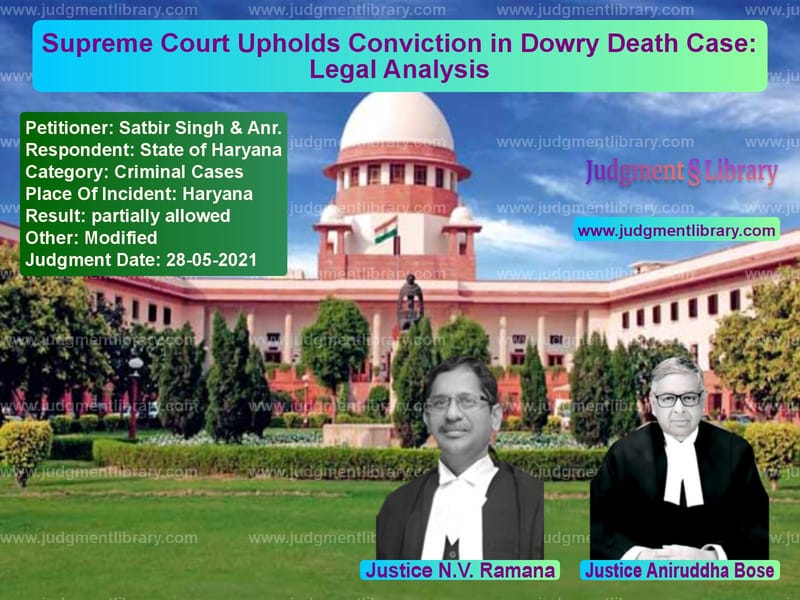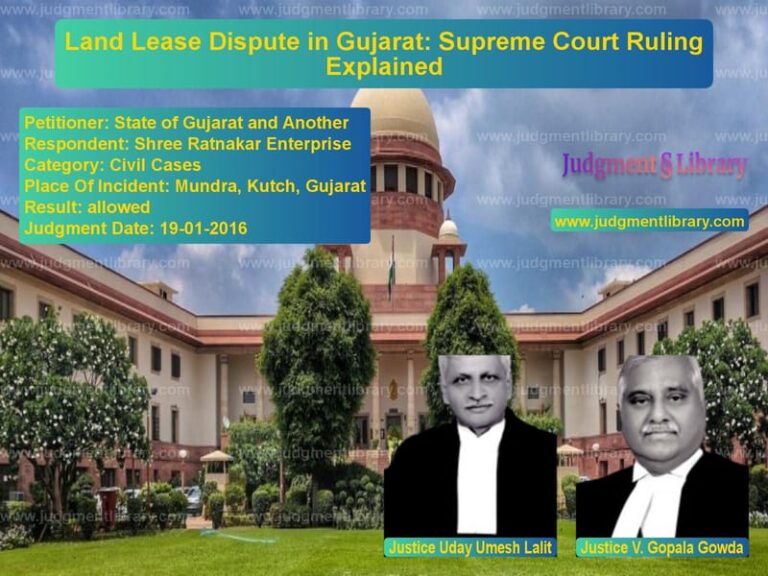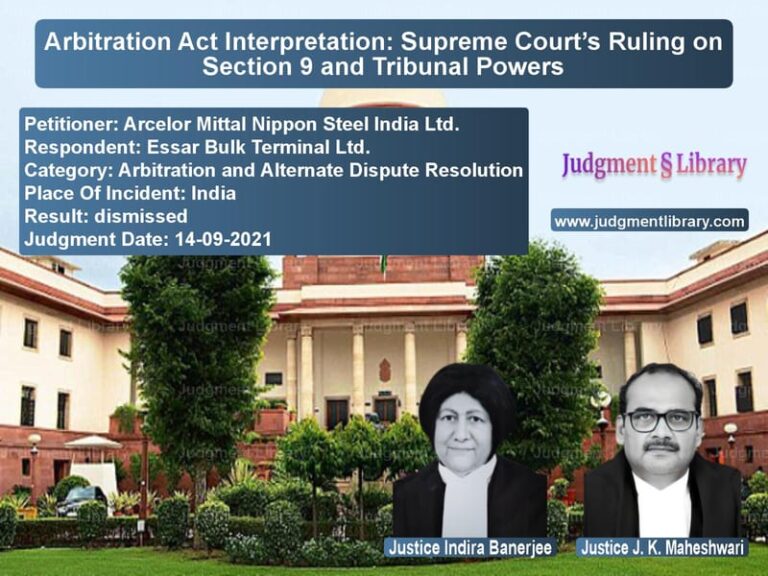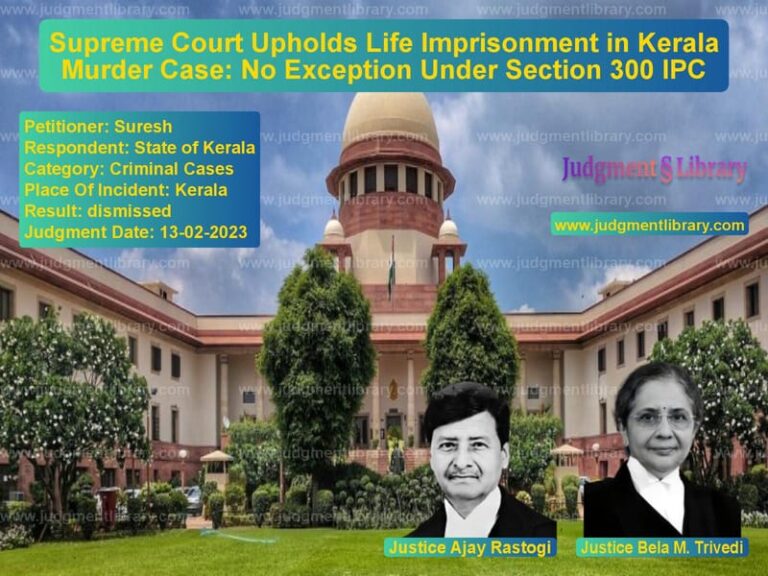Supreme Court Upholds Conviction in Dowry Death Case: Legal Analysis
The Supreme Court of India, in its judgment dated May 28, 2021, in the case of Satbir Singh & Anr. v. State of Haryana, upheld the conviction of the appellants under Section 304-B of the Indian Penal Code (IPC) for dowry death while setting aside their conviction under Section 306 IPC for abetment of suicide. The ruling underscores the judicial approach towards dowry-related crimes and reinforces the legal framework against such offenses.
Background of the Case
The case arose from the tragic death of a woman who died due to burn injuries within one year of her marriage. The prosecution alleged that she was subjected to harassment and cruelty by her husband and mother-in-law due to insufficient dowry. The trial court convicted both accused under Sections 304-B and 306 IPC and sentenced them to seven years of rigorous imprisonment for dowry death and five years for abetment of suicide. The Punjab and Haryana High Court upheld the trial court’s decision. The appellants challenged the concurrent findings of guilt before the Supreme Court.
Key Legal Issues
- Whether the conviction of the accused under Section 304-B IPC was legally sustainable?
- Whether the charge under Section 306 IPC (abetment of suicide) was proved beyond a reasonable doubt?
- Whether the trial court and the High Court properly applied the presumption under Section 113-B of the Evidence Act?
Arguments of the Appellants
The appellants, represented by their counsel, made the following submissions:
- The prosecution failed to prove beyond a reasonable doubt that the deceased was subjected to cruelty in connection with dowry demands soon before her death.
- There was no direct evidence linking the accused to the alleged harassment leading to the deceased’s death.
- The possibility of accidental fire was not ruled out.
- The trial court and the High Court erred in convicting the accused based solely on presumptions rather than substantive evidence.
Arguments of the Respondent (State of Haryana)
The State countered the arguments of the appellants by stating:
- The deceased died under unnatural circumstances within one year of marriage, triggering the presumption under Section 113-B of the Evidence Act.
- There was sufficient evidence showing that the deceased was harassed and subjected to cruelty for dowry demands before her death.
- The conviction under Section 304-B IPC was based on well-established judicial principles and required no interference.
Supreme Court’s Observations
1. The Legal Framework Under Section 304-B IPC
The Supreme Court examined the statutory requirements of Section 304-B IPC and reiterated:
“Where the death of a woman is caused by burns or bodily injury or occurs otherwise than under normal circumstances within seven years of marriage, and it is shown that soon before her death she was subjected to cruelty or harassment by her husband or his relatives in connection with dowry demand, such death shall be called ‘dowry death’ and the husband or his relatives shall be deemed to have caused the death.”
2. Proximity Between Harassment and Death
The Court highlighted the importance of establishing a “proximate and live link” between the harassment and the death:
“The phrase ‘soon before’ does not mean ‘immediately before.’ Courts must assess whether the harassment was sufficiently close in time to the death to establish causation.”
3. Presumption Under Section 113-B of the Evidence Act
The Court emphasized that once the prosecution establishes the necessary ingredients of Section 304-B IPC, the presumption of guilt under Section 113-B of the Evidence Act applies:
“The burden then shifts to the accused to prove that the death was not due to dowry-related harassment.”
4. Reversal of Conviction Under Section 306 IPC
On the charge of abetment of suicide under Section 306 IPC, the Court ruled that the prosecution failed to establish direct incitement:
“The essential element of direct and active instigation by the accused was absent. Therefore, the conviction under Section 306 IPC cannot be sustained.”
Final Judgment
The Supreme Court delivered the following verdict:
“The conviction under Section 304-B IPC is upheld. However, the conviction under Section 306 IPC is set aside. The appeal is allowed to the extent of setting aside the conviction for abetment of suicide.”
Impact of the Judgment
- Reaffirms the mandatory presumption under Section 113-B of the Evidence Act in dowry death cases.
- Clarifies that the phrase ‘soon before her death’ should be interpreted in a flexible manner based on case facts.
- Ensures that the burden shifts to the accused once foundational facts of dowry-related cruelty are proved.
- Prevents misuse of Section 306 IPC by requiring specific proof of incitement for abetment of suicide.
Conclusion
The Supreme Court’s judgment in Satbir Singh & Anr. v. State of Haryana serves as a crucial precedent in cases involving dowry deaths. It underscores the judicial commitment to protecting women from dowry-related harassment while ensuring that wrongful convictions do not occur under Section 306 IPC. The ruling strengthens the enforcement of anti-dowry laws and sets guidelines for interpreting evidentiary presumptions in such cases.
Petitioner Name: Satbir Singh & Anr..Respondent Name: State of Haryana.Judgment By: Justice N.V. Ramana, Justice Aniruddha Bose.Place Of Incident: Haryana.Judgment Date: 28-05-2021.
Don’t miss out on the full details! Download the complete judgment in PDF format below and gain valuable insights instantly!
Download Judgment: satbir-singh-&-anr.-vs-state-of-haryana-supreme-court-of-india-judgment-dated-28-05-2021.pdf
Directly Download Judgment: Directly download this Judgment
See all petitions in Dowry Cases
See all petitions in Murder Cases
See all petitions in Bail and Anticipatory Bail
See all petitions in Judgment by N.V. Ramana
See all petitions in Judgment by Aniruddha Bose
See all petitions in partially allowed
See all petitions in Modified
See all petitions in supreme court of India judgments May 2021
See all petitions in 2021 judgments
See all posts in Criminal Cases Category
See all allowed petitions in Criminal Cases Category
See all Dismissed petitions in Criminal Cases Category
See all partially allowed petitions in Criminal Cases Category







